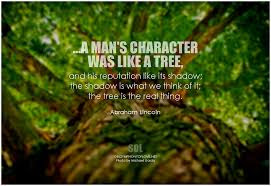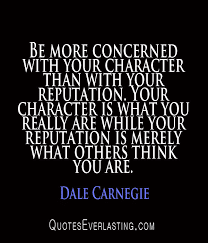REPUTATION V/S CHARACTER
 |
| Reputation v/s Character |
The culture that we
live in has a huge role in our attitude towards life and the kind of people we
continuously surround ourselves with impact our personality. The things that we
value are determined by the culture we live in and the beliefs which that
culture has embedded in our minds. Consciously or Subconsciously, we have
accepted these beliefs and tend to continue to live on these beliefs. One of
such dilemma is this, which is more important: REPUTATION or CHARACTER?
Most of us are brought
up in life in a way that have internalized an idea in our mind that a good
reputation is more important than having a genuine a good character. We have
made our public image a higher priority than our personal or corporate
responsibilities. Many people today prioritize their public image more important
than their self-image. They believe that what others think about them is more
important than what they think about themselves. And in doing so, we have
failed to recognize the alarming need to protect and safeguard our integrity.
That is why, we have seen a lot of leadership failures in different areas of
life. Because most of the leaders today confuse reputation with character. We
have made reputation more important than character and personal responsibility.
Reputation is not the same as character. Before we go further, let’s look at
the difference between reputation and character:
REPUTATION is what
others think about you. But,
CHARACTER is the truth
about yourself.
REPUTATION is who you
are in public. But,
CHARACTER is who you
are in private.
Each of us has a
reputation – it is the perception other people have of us. People often “sell”
an enhanced picture of themselves to others; they promote a public image that
is not who they really are. Then, they start to believe the trials rather than
the reality. It is ethically dangerous for us to be more concerned with what
others think of us than with what we know to be the truth about ourselves.
When you know who you
are, other people’s opinion about you doesn’t matter to you. True leaders have
therefore declared independence from the expectation of others. When you don’t
know yourself, you try to live onto other people’s opinions and their
expectation. All the branding which is in the market works on this concept, the
fashion industry works due to your poor self-image of who you are. Character
means being your true self. Most of the leadership failures that we see in the
government and politics are due to character defects.
Therefore, mere
reputation does not have the capacity to sustain you, because it is not based
on reality. We should never trust our reputation nor should we trust other
people’s reputation, because it has the capacity to deceive us. So, we must
avoid promoting a false image of ourselves because life has a way of eventually
bringing our private self to the public stage.
 |
| Reputation v/s Character |
CHARACTER means a
commitment to a set of standards, values and principles which you will never
violate on the altar of convenience. You become a person of character when you
are willing to sacrifice your power, position, money, titles and everything
that you have acquired through out your life for the sake of your character.
CHARACTER means a
continuous effort to integrate your thoughts, words and actions. Character
means that you are the same person anytime and at anyplace. Integrity means
‘one’. You are not a ‘two-faced’ or a ‘hypocrite’. Character means what you do
when no one is watching you? Character means what you do when no body will find
out what you have done. Therefore, never disconnect from yourself. Integrity is
when your private life and public life becomes one.
Character is so much
important for all of us, and therefore it is called the moral force of
leadership. That’s why when a true leader faces criticism and persecution from
the people for the sake of righteousness, they don’t need to speak much.
Because their character is louder than their words.
Reputation is not
something that you have to pursue. It will be a by-product of your character.
People will respect you for your character, so you never have to strive to
maintain or protect your reputation. If you seek to defend your reputation, you
will move away from ethical consideration. You should focus on maintaining your
character and protecting your integrity. The more you develop your character the
less concerned you will be about your reputation.
True leaders never
compromise with their principles and moral standards. Mahatma Gandhi was a man
who was about 4 feet 9 inches tall, weighed 38 kilograms. He was sitting in a
jail cell and he told the empire of Great Britain, “You got to let my people
go”. He refused to eat anything until the people of India were set free. His
commitment to his principles was so strong that he never compromised with them.
His moral force of POWER OF CHARACTER defeated the British Empire without a
bullet. Do you consider your convictions more important than anything else?
 |
| Reputation v/s Character |
Conclusion:
You are not remembered
for what you compromised for, you are remembered for what you stood for. Isn’t
this tragic that some people live for 80 years and when they die, we forget
them? Memories are created by character not with compromise or reputation. We
remember Dr. APJ Abdul Kalam, Mahatma Gandhi, Nelson Mandela, Martin Luther
King Jr. and many other leaders of history because they never compromised with
their principles and moral standards that they had set for themselves. So, what
do you value: REPUTATION or CHARACTER?














0 comments:
Post a Comment
Please do not enter any spam link in the comment box.